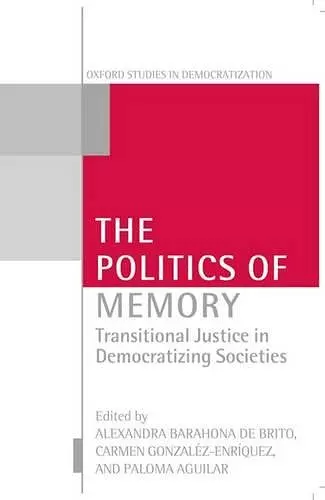The Politics of Memory
Transitional Justice in Democratizing Societies
Paloma Aguilar editor Alexandra Barahona de Brito editor Carmen Gonzalez Enriquez editor
Format:Paperback
Publisher:Oxford University Press
Published:5th Apr '01
Currently unavailable, and unfortunately no date known when it will be back
This paperback is available in another edition too:
- Hardback£142.50(9780199240807)

One of the most important political and ethical questions faced during a political transition from authoritarian or totalitarian to democratic rule is how to deal with legacies of repression. Indeed, some of the most fundamental questions regarding law, morality and politics are raised at such times, as societies look back to understand how they lost their moral and political compass, failing to contain violence and promote the values of tolerance and peace. The Politics of Memory sheds light on this important aspect of transitional politics, assessing how Portugal, Spain, the countries of Central and Eastern Europe and Germany after reunification, Russia, the Southern Cone of Latin America and Central America, as well as South Africa, have confronted legacies of repression. The book examines the presence - or absence - of three types of official efforts to come to terms with the past: truth commissions, trials and amnesties, and purges. In addition, it looks at unofficial initiatives emerging from within society, usually involving human rights organisations (HROs), churches or political parties. Where relevant, it also examines the 'politics of memory,' whereby societies re-work the past in an effort to come to terms with it, both during the transitions and long after official transitional policies have been implemented or forgotten. The book also assesses the significance of forms of reckoning with the past for a process of democratization or democratic deepening. It also focuses on the role of international actors in such processes, as external players are becoming increasingly influential in shaping national policy where human rights are concerned.
The outstanding merit of this book lies in its value as a reference text. The excellent bibliographical survey of the literature includes web-based material and surveys the main debates about transitional truth and justice, compensation and restitution, the politics of memory including issues of commemoration ... The icing on the rich cake of this book is provided by the 54 pages of references cited by the various authors, and including references for the works included in the bibliographical essay. The scholarship is apparent, and the value of this work - as a reference, and a detached, legal and scientific analysis in a field that is often heavy with emotion - is clear. * The Global Review of Ethnopolitics *
The chapters on countries/regions provide valuable insights into the specifics of the case studies they examine, and also contribute insights that have broader applicability. Many of these broader insights are brought together in the impressive encyclopedic analysis contained in the conclusion. * The Global Review of Ethnopolitics *
The book's overall conclusions on truth processes and commissions are particularly of interest to a Northern Ireland audience, where the debate continues about the viability or desirability of some formal truth process. * The Global Review of Ethnopolitics *
Highly recommended to students of transitions to democracy, human rights lawyers and activists, politicians and constitution-designers involved in the framing of institutions of new democracies and to the general public interested in the difficult struggles of Truth and Justice. * Democratization *
This interdisciplinary study is a welcome addition to the literature ... the book maintains an internal coherence, an aim difficult to achieve in this kind of collective work. It is an illuminating interdisciplinary contribution to the topic, enriched from different perspectives and disciplines. * Democratization *
ISBN: 9780199240906
Dimensions: 235mm x 156mm x 23mm
Weight: 694g
440 pages